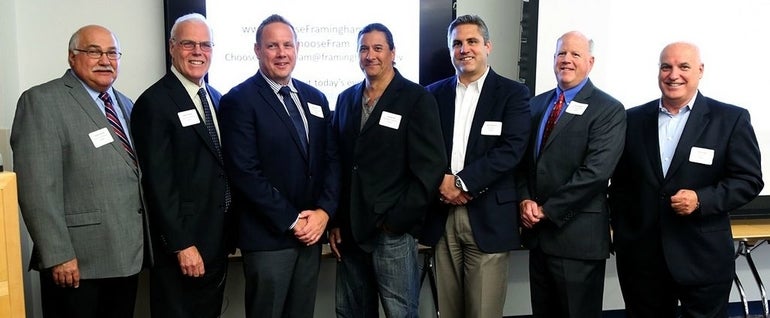At the center of MetroWest and about 20 miles from Boston, Framingham looks to have an edge over many communities when it comes to economic development prospects.
But town officials believe Framingham could be doing more to develop commercial properties, especially near exits 12 and 13 off the Massachusetts Turnpike.
“It may have been, at times, we’ve taken it for granted,” Town Manager Robert Halpin said Monday of the town’s position.
With 68,000 residents, Framingham also employs the most people of any MetroWest town. According to 2008 data published by the town, the job count stood at 45,000, representing 41 percent of the region’s total employment. But Framingham officials are hoping to boost the town higher with a new business-friendliness campaign, “Choose Framingham for Business.”
Step 1: Streamlined permitting
At the heart of the campaign are changes to the permitting process. Halpin said it’s important for all town offices to work together so companies can have their projects permitted in a timely manner. It’s also crucial for town officials to foster good relationships with brokers and business consultants, who advise their clients on how difficult or easy expansion or relocation will be, depending on a town’s permitting policies.
Large firms, like drug company Genzyme Corp., can lose millions of dollars if projects are delayed, Halpin noted. Last fall, Genzyme announced plans to build a new processing facility, and under its streamlined permitting process, the town was able to issue all requisite permits in less than five months, Halpin said.
In addition, the recent hire of a fire safety engineer within the Framingham Fire Department proved instrumental, as the engineer advised Genzyme on fire code matters throughout the permitting process.
“Genzyme felt that was a big value-add,” Halpin said.
Genzyme hosted last week’s “Choose Framingham for Business” launch at its Mountain Way campus. Paul Logue, vice president and general manager at Genzyme’s Framingham biologics division, shared his experience working with the town, along with a handful of other business leaders and real estate brokers.
Framingham is not alone in adopting streamlined permitting. Natick, its next-door neighbor, employs a similar concept, as do communities like Westborough and Marlborough. Arthur Robert, director of Community and Economic Development in Framingham, said Devens, the redeveloped site of the former Fort Devens in Ayer, Shirley and Harvard, set the “gold standard” in streamlined permitting, and cities and towns are now adopting similar policies to stay competitive.
Fresh perspectives
The Framingham business community is also enjoying fresh perspectives, with Halpin stepping in as town manager two years ago and Robert arriving in December, after 17 years with the state economic development office.
Robert, who once headed economic development efforts at the state’s MetroWest regional office, said the challenge of continuing economic development in a large town like Framingham, which is largely built out, appealed to him.
“I came to Framingham because I saw an opportunity,” Robert said.
Meanwhile, similar efforts are playing out in other MetroWest communities. David McCay, a real estate attorney at Mirick O’Connell in Westborough, chairs the newly-formed Southborough Economic Development Committee. McCay said officials there are just beginning to find out how to market Southborough’s commercial real estate parcels to today’s tenants.
“I think a lot of towns are trying to get into that space right now,” McCay said, adding that declining local aid is creating a need for new tax revenue. “A lot of this is being driven by the economics. Cities and towns are looking to commercial and business properties to help generate tax revenue for the town.”
While location is a fixed factor, McCay said communities must determine how to manipulate factors they can control to their advantage, like permitting and taxes.
In that regard, Framingham may be at a disadvantage. With a dual tax rate, businesses pay nearly $41 per $1,000 assessed property valuation, compared to about $18 for residents.

